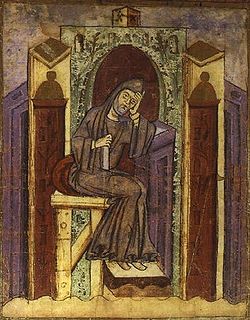Notker Balbulus
Notker Balbulus ("Notker den stammande") eller Notker av S:t Gallen, född omkring 840 i Heligau eller Jonschwil, död 912 i Sankt Gallen, Schweiz, var en lärd, musiker, poet och benediktinmunk i katedralen i Sankt Gallen.
Notker var författare till Liber Ymnorum (884 utgiven av Liutward von Vercelli) som samlar ett antal hymner som är nedtecknade med både text och tonhöjd, och är således tidiga exempel på europeisk musiknotation. Han tillskrivs hymnen Media vita in morte sumus men kan även ha uppstått omkring 750 i Frankrike. Den hymnen sjöngs under medeltiden allmänt som vallfärds-och krigssång, vid livsfara under storm på havet och liknande.
- Gesta Karoli Magni, en av de vackraste berättelserna från tyska medeltiden.
Källor
Presentation på Adlibris
Winner of the Palisca Prize by the American Musicological Society, 2017 These two volumes present an important and distinctive collection of Carolingian poetry, composed for the liturgy in the last quarter of the ninth century by Notker Balbulus ("the stammerer"), monk of St Gall (d. 912). Notker was not the first liturgical composer inspired by the Carolingian renaissance of learning to make new texts for elaborate Alleluia melodies, but hewas certainly the first to raise the sequence genre to a consistently refined linguistic and theological level, and to provide a repertory for the annual cycle of holy feasts. His collection circulated widely in Germanic areas inthe tenth and eleventh centuries, while some of his compositions - such as Sancti spiritus - became staples throughout Europe. Notker's Liber ymnorum has never before been edited with the melodies after which his sequences were fashioned and to which they were sung. Provided here is a full edition of Notker's dedicatory preface, followed by 49 sequences. Each sequence is presented with two musical notations ("Carolingian", in neumes, and pitched on staves), followed by translations and an extensive commentary. A full introduction provides a context for the work. (1468 kr)
